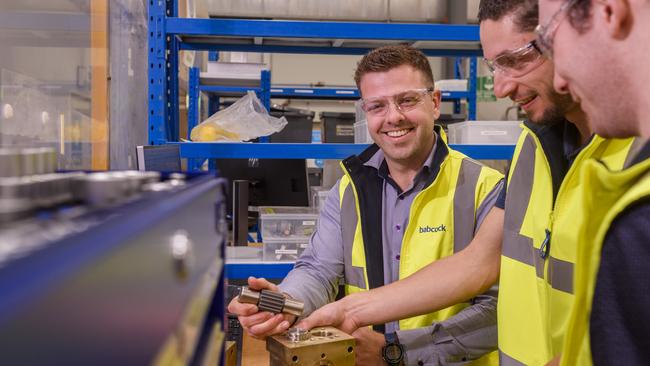Up skilling workforce to support industry a ‘challenge’
Upskilling and growing our workforce to support the delivery of the nation’s inaugural nuclear-powered submarines is one of Australia’s biggest challenges.

Enticing the next generation of Australians into the defence industry and upskilling and growing our workforce to support the delivery of the nation’s inaugural nuclear-powered submarines is one of Australia’s biggest challenges.
In the coming years and decades, the nation needs to upskill both blue- and white-collar workforces on a scale never seen before.
The only way we will be able to achieve getting the thousands of people required to support this endeavour is through whole-of-nation, whole-of-industry support.

The AUKUS trilateral partnership allows Australia to lean on the experience, heritage and expertise of other nations – such as the UK and the US – which have been supporting this capability for decades.
If we are going to deliver the AUKUS agenda to the current timelines, Australia will need this support more than ever and the nation will need partners like Babcock.
Babcock is partnering with global defence companies, the defence industry and academia to accelerate the nation’s critical defence industry workforce.
Recent partnership announcements to support skilling up our workforce include:
● Joining forces with Huntington Ingalls Industries (HII) – America’s largest shipbuilder – to support critical capability requirements for the once-in-a-generation AUKUS nuclear submarine program. Babcock and HII will collaborate to develop the optimal models for nuclear-powered submarine capability, including infrastructure, sustainment and the necessary skills development, to support the AUKUS endeavour;
● Forming a new, dedicated partnership – the AUKUS Workforce Alliance (AWA) – with the University of Adelaide, Curtin University and the University of NSW to address the current and future workforce required to accelerate sovereign capability, capacity and resilience for Australia’s defence sector;
● Working with the WA government through a new MOU designed to support the creation of high-paying, skilled jobs for decades at the Australian Marine Complex (AMC) in Henderson, as well as at HMAS Stirling on Garden Island;
● An MOU with the University of Adelaide in a commitment to work together on developing Australia’s workforce and skills through new initiatives and projects to support current defence programs and AUKUS;
● Working with HII and Bechtel Australia to support the required nuclear-powered submarine program from infrastructure build through to the end of life of the submarines, including skilled workforce development.
Babcock employs 1800 people across Australia and New Zealand and more than 26,000 people worldwide.
We are global leaders in nuclear-submarine capability, playing a crucial role in the UK, US and Australia’s submarine programs today.
With decades of experience supporting the Royal Navy’s submarine fleet, Babcock can support the critical skills development required in Australia through our experience, knowledge and know-how.
To young people who may be reading this piece, I highly encourage exploring a career in the defence industry.
Not only is working in the defence industry exciting and a long-term career option, you know you will be contributing to the nation’s safety, security and sovereignty now and for decades to come.
At Babcock, our mission is creating a safe and secure world, together.
-
Andrew Cridland is Babcock Australasia CEO.


